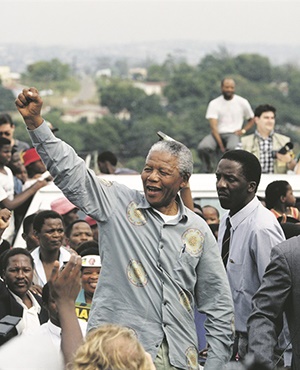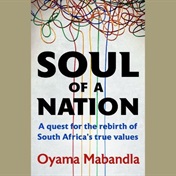
Dare Not Linger is based on Mandela’s unfinished memoir. In this edited extract, he recalls his threat to withdraw government funding to the IFP.
Throughout his time in office, Mandela’s attitude towards the traditional leaders of KwaZulu-Natal was ambivalent:
‘At the outset one must concede that this section of our people are intensely nationalistic, proud and brave. They are immensely inspired by the spectacular achievements of uNodumehlezi, or the black Napoleon as the colonial historians sometimes refer to King Shaka.
‘In my long association with amaZulu, I found that the majority are men and women I deeply admire.
‘I have enormous respect for Mangosuthu Buthelezi, Minister of Home Affairs, in particular, a formidable survivor, who defeated us in two free and fair general elections, firstly in April 1994 and again in June 1999. We used as ammunition against him facts which are of common knowledge, that he was a Bantustan leader, that although he refused to take independence as other Bantustans had done, he worked hand in hand with the apartheid regime, that they gave him funds to oppose sanctions and the armed struggle, that he formed the trade union UWUSA [United Workers Union of SA] to undermine the progressive and dynamic policies of Cosatu and the SACP. We even had more damaging allegations than those set out above. All these failed to tarnish his reputation, and he remains to the present day a powerful public figure that cannot be ignored.
‘But few will deny that there is still a hard, arrogant core of influential traditionalists who think that they are superior to other African groups in the country. At a meeting with amaZulu traditional leaders in Durban, Prince Gideon Zulu accused me of having insulted the amaZulu in general and their King Zwelithini in particular, when I put him on the same level as King Mayishe II of amaNdebele. I sharply criticised such an arrogant approach and bluntly told him that there were many monarchs that were highly respected in our country. AmaNdebele, I pointed out, were a proud and fearless tribe that had made an important contribution in our history. I added that it was a dangerous delusion on the part of amaZulu to think there was only one black King in the country.
‘There is a disputed area in the Transkei which is claimed by both Thandizulu Sigcau, King of Eastern Pondoland, and by Zwelithini. The two Kings, Minister Buthelezi and myself attended a meeting in that area. I was shocked and embarrassed when Thandizulu was sidelined and told to sit behind Zwelithini and Buthelezi. In spite of my enormous respect for Zwelithini, I could not keep quiet. I intervened and made sure that Thandizulu sat next to Zwelithini in the front seats.
‘There are many members of this famous tribe who are like Deputy President Jacob Zuma and Dr Ben Ngubane of the Inkatha Freedom Party and Minister of Arts, Culture, Science and Technology. These two politicians are a shining example of leaders who consistently put the welfare of the country above personal or party interests. They are broadminded and are committed to the unity of our people.’
Mandela maintained cordial, some will even say friendly, relations with Buthelezi on the basis that the latter had turned down the blandishments of apartheid self-rule in the Bantustans and kept the prisoner ‘informed of what was happening outside’. Many in the ANC didn’t, however, including the leadership in exile, like national executive committee member John Nkadimeng, who pronounced on a Radio Freedom broadcast that ‘the puppet Gatsha [Buthelezi] is being groomed by the West and the racist regime to become a [Jonas] Savimbi, in a future free South Africa. The onus is on the people of South Africa to neutralise the Gatsha snake, which is poisoning the people of South Africa. It needs to be hit over the head.’ […]
Mandela himself explained to [Rick] Stengel that Buthelezi ‘did not honour arrangements which were made between Inkatha and the ANC … [and] our people got annoyed with him. You see, Inkatha was started by the ANC to work as a legal arm of the ANC inside the country and there was an agreement to that effect’. But, Mandela states, ‘once Inkatha was now established, Buthelezi decided … to break away from the ANC and to develop it as his own political organisation, and that soured relations’.
As part of its strategy to stem the violence in KwaZulu-Natal, the government developed an approach to the conflict where peace was to be the dominant theme of politics; traditional leaders were to be extracted from party political control and security action was to be informed by information gathering and undercover work. Mandela stated that the ANC had been ‘unequivocal in its belief that a hidden hand is behind this violence’. He also believed that top leadership should be deployed ‘in these dangerous areas’, with adequate security measures being taken.
‘Nothing,’ Mandela felt, ‘discourages people on the ground more than the continued absence of the top leadership in these problematic areas.’
Just as Mandela had sought the support of PW Botha to counter the threat of violence by the Afrikaner right wing, he now called on King Goodwill Zwelithini. ‘My goal,’ Mandela said, ‘was to forge an independent relationship with the king, separate from my relationship with Chief Buthelezi. The king was the true hereditary leader of the Zulus, who loved and respected him. Fidelity to the king was far more widespread in KwaZulu-Natal than allegiance to Inkatha.’
In making this approach, he wasn’t surrendering anything; he would bend over backwards to bring about peace. Walter Sisulu had described his comrade and protégé as a very tough person, adding, ‘I think there are very few people who’ve got the qualities of Nelson. Nelson is a fighter; Nelson is a peacemaker.’
King Zwelithini gradually came to accept that, as king of a nation of people who belonged to different political parties, he was the only traditional leader who transcended party political disputes.
The continuing violence and inflammatory talk evoked an angry reaction from Mandela. It all began in 1995 on a May Day rally in Umlazi, a sprawling township some 25km to the southeast of Durban.
The rally was held a week after Buthelezi had called on his supporters, in an address at the same stadium, to ‘rise and resist the central government’ if the IFP’s constitutional demands were not met. As the police used rubber bullets and tear gas to clear the residents that had massed since morning, and to prevent IFP supporters from marching to the rally, an undeterred Mandela continued talking. An article in the Mail & Guardian described how ‘as more shots sent his supporters ducking behind rows of buses outside, Mandela departed from his speech to let loose perhaps the most militant remark of his presidency: “[Inkatha] should know it is [central government] who is giving them money and they are using the money against my government ... should they continue, I’m going to withdraw the money”.’
Caught by surprise, the president’s office quickly briefed the media, contextualising Mandela’s threat as a ‘timely warning’ to the province.
Had it been left unexplained, it would have been unconstitutional. Later, in Parliament, Mandela elaborated, aware of the political firestorm his remarks had loosed.
The reduction of tensions in the province of KwaZulu-Natal was, he said, ‘one of the most urgent priorities faced by politicians’. Referring to the Constitution, he reminded MPs and senators that human life was more important than the Constitution – and he would step in and protect human lives, for that was what was at stake.
‘I have briefed the leaders of political parties inside and outside the Government of National Unity, that there is a serious situation in KwaZulu-Natal. Chief Buthelezi has made a public call to Zulus to rise against the central government. He has said that if they do not get the right to self-determination, it is not worth being alive. Not only has he made this statement, but [also] this threat is now being implemented in that province.’
Citing a long list of violations by the IFP, where lives had been lost, he lashed members of the opposition for their hypocrisy on human rights. He said:
‘Members here who have never known about the tradition of human rights and of democracy are now giving gratuitous advice to those people who fought hard to bring about democracy and the culture of human rights in this country. They are talking about the sanctity of the Constitution and yet, when they were in power, at the slightest excuse, they interfered with the Constitution. They even amended the entrenched process which protected the language rights of people in this country, and took away one of the most important rights of people, the right of the coloured people to vote in this country. Now they are lecturing us on the sanctity of the Constitution.’
In full flight, but weary, Mandela ended his address, explaining what had motivated him to threaten withdrawing funding from KwaZulu-Natal:
‘I agree that the Constitution is very important, and it is a matter of serious concern when the President of a country threatens to change the Constitution, but I am determined to protect human life. The perception that whites in this country do not care about black lives is there. I may not share it but it is there. The discussions here, where reference is not even made to the principal reason for my having taken this tough line to protect human lives, unfortunately goes a long way in confirming that perception.’
Dare Not Linger: The Presidential Years by Nelson Mandela and Mandla Langa, Pan Macmillan, 384 pages, R290 at takealot.com (hardcover)




 Publications
Publications
 Partners
Partners











